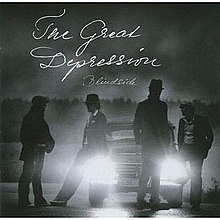The Great Depression (Blindside album)
This article has multiple issues. Please help improve it or discuss these issues on the talk page. (Learn how and when to remove these template messages)
|
| The Great Depression | ||||
|---|---|---|---|---|
 | ||||
| Studio album by | ||||
| Released | August 2, 2005 | |||
| Recorded | January–April 2005 | |||
| Length | 53:28 | |||
| Label | DRT, Wasa | |||
| Producer | Lasse Mårtén | |||
| Blindside chronology | ||||
| ||||
| Review scores | |
|---|---|
| Source | Rating |
| The Phantom Tollbooth | |
| Jesus Freak Hideout | |
The Great Depression is the fifth studio album from post-hardcore band Blindside. It is their first album for DRT Entertainment. The album was largely influenced by a trip to Africa that their lead singer, Christian, had undertaken. He was very unsettled by his experience and the things he saw influenced the album immensely.[citation needed] The song "Yemkela" was written about a young African boy he met on his trip.[citation needed] The boy had HIV and had less than two months to live. However, in a recent interview, Christian Lindskog revealed that on a recent tour in South Africa, he had seen Yemkela (who Christian expected would be dead) at a show in Cape Town. To Christian's surprise, he was doing well and watched Blindside perform his song and sang along. This Performance was released on a documentary packaged with Blindside's 2011 album "With Shivering Hearts We Wait."
Track listing[edit]
- "The Great Depression" – 1:27
- "This Is a Heart Attack" – 3:10
- "Ask Me Now" – 3:34
- "We're All Going to Die" – 3:00
- "Yemkela" – 3:38
- "Put Back the Stars" – 3:57
- "Fell in Love With the Game" – 4:07
- "City Lights" – 3:13
- "We Are to Follow" – 4:02
- "You Must Be Bleeding Under Your Eyelids" – 4:56
- "My Alibi" – 4:33
- "Come to Rest (Hesychia)" – 4:29
- "This Time" – 4:47
- "When I Remember" – 4:27
Singles[edit]
- "Fell in Love With the Game"
- "When I Remember"
Personnel[edit]
- Christian Lindskog – Lead vocals
- Simon Grenehed – guitars, backing vocals
- Tomas Näslund – Bass guitar
- Marcus Dahlström – Drums
Guest musicians[edit]
- J. Jamte – "You Must Be Bleeding Under Your Eyelids"
- Ilkka Viitasalo (of Benea Reach) – "Come to Rest (Hesychia)"
Trivia[edit]
- "Fell in Love With the Game" contains the line "We wrestle in the mud and the blood and the beer," which references the Johnny Cash song "A Boy Named Sue."
